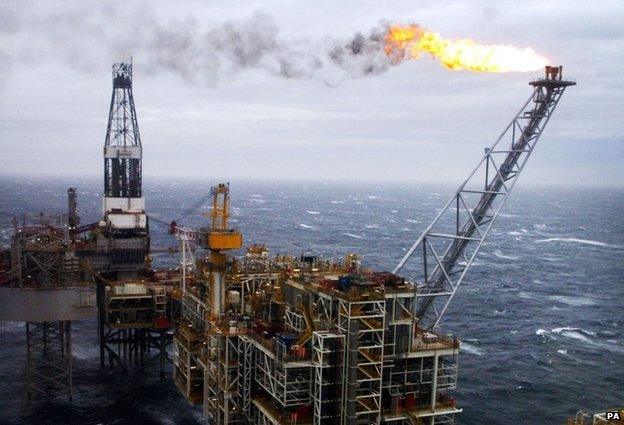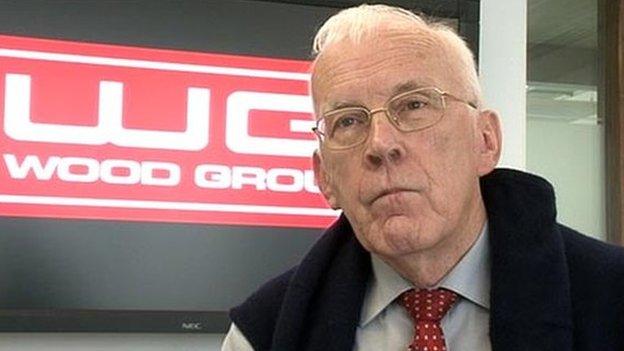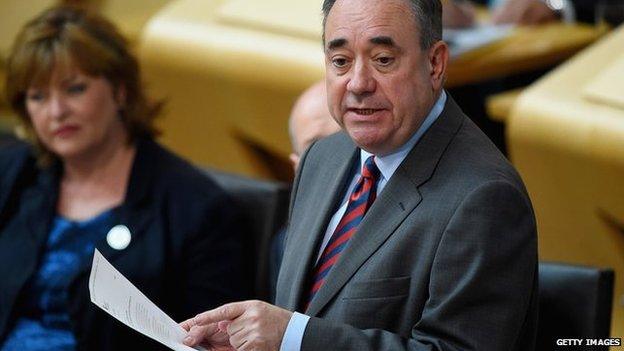Scottish independence: Academics back higher North Sea oil estimate
- Published

Future North Sea oil and gas income is one of the main battlegrounds in the referendum debate
A projection by industry body Oil and Gas UK that 24bn barrels of oil can be extracted from the North Sea is "plausible", two academics have said.
The projection has been used by the Scottish government as part of its campaign for independence.
Last week industry figure Sir Ian Wood claimed the figure was too high.
Professors Alex Russell and Peter Strachan of Robert Gordon University said there was a "potential" for the higher projection to be met.
Sir Ian claimed there were about 15bn to 16.5bn barrels of recoverable oil left and that the figure from Oil and Gas UK, used in the Scottish government's White Paper, external was between 45% and 60% too high.
He predicted that oil and gas revenues would run down with "a big impact on our economy, jobs and balance of payments".
Following Sir Ian's prediction, Melfort Campbell, chairman of a Scottish government commission into the future of North Sea oil said the industry would be "hard-pushed" to extract 15bn barrels.

Sir Ian Wood recently headed a major oil industry review
'Extremely wealthy'
However, Oil and Gas UK has stood by its projection, which was endorsed by Prof Russell, who is professor of petroleum accounting at Aberdeen Business School, and Prof Strachan, both from Robert Gordon University in Aberdeen.
They said: "The healthy 16bn barrels or so of oil equivalent figures now widely accepted by all campaigners in the referendum debate (apart from the ludicrously pessimistic forecasts from the Office for Budgetary Responsibility) as being economically exploitable from existing discoveries is surely an understatement of the future potential of North Sea production.
"Prof Alex Kemp and [learning support assistant] Linda Stephen have modelled future production based on oil prices at $90 per barrel and arrived at future production figures up to 2050 of between 15 and 16.5bn barrels of oil equivalent.
"Since current oil prices are higher than $90 and likely to rise and as improvement in technology continue then the ultimate potential of 24bn barrels of oil equivalent foreseen by Oil and Gas UK appears plausible."
They added: "There is no question that had Scotland been an independent country in 1975, say, that Scotland would be extremely wealthy now and there would be no national debt."
In July the the Office for Budget Responsibility (OBR), cut its estimate of tax income from the North Sea between 2020 and 2041 by a quarter, to £40bn.
This led Chief Secretary to the Treasury Danny Alexander to accuse First Minister Alex Salmond of offering voters a "fantastical" future based on unrealistic oil forecasts.

Alex Salmond clashed with opposition leaders over oil in the final first minister's questions before the referendum
Mr Salmond dismissed the OBR's assessment as "stuff and nonsense". He has also continued to back a higher estimate of remaining oil reserves.
Responding to Sir Ian's claims during the final first minister's questions before the 18 September referendum, Mr Salmond said that the equivalent of 15bn to 16.5bn barrels could be taken out up to 2050, with this rising to a total of 24bn in the years after that.
'Substantial cuts'
SNP Treasury spokesman Stewart Hosie said the latest academic intervention should "put to bed some of the nonsense which is being peddled by the No campaign on Scotland's oil wealth".
He added: "Westminster politicians have been claiming for decades that oil is a curse for Scotland and a blessing for every other country, but people are now seeing through that, and on September 18 have the opportunity of a lifetime to put Scotland's wealth in Scotland's hands."
But Mr Alexander backed Sir Ian's oil estimates.
"It undermines the case that the SNP has made, which is built on fantastical over-optimistic oil predictions in order to pretend that somehow in an independent Scotland various policies could be afforded," he said.
"An independent Scotland from day one would have no choice but to make substantial cuts to public services or substantial increases to income tax for people in Scotland."